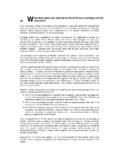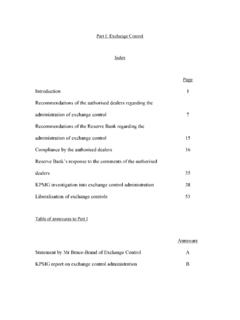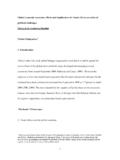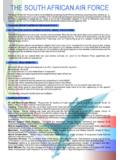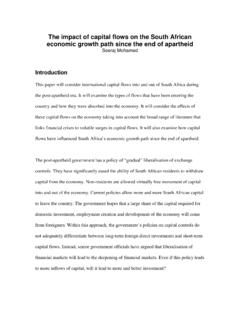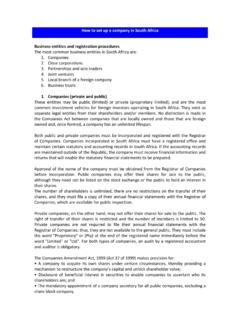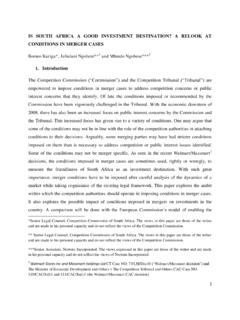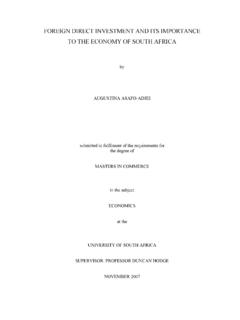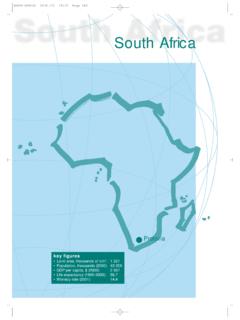Transcription of F. EXCHANGE CONTROL IN SOUTH AFRICA The South …
1 49 PART CONTROL IN SOUTH AFRICAThe SOUTH african reserve BankThe SARB was established as the central bank of SOUTH AFRICA in 1921 interms of the Currency and Banking Act No. 31 of 1920. This 'Act wasreplaced in 1944 by the SOUTH african reserve Bank Act No. 29 of 1989 the SOUTH african reserve Bank Act No. 90 of 1989 (the SARBAct) was promulgated and is currently still in force as amended from timeto bank has been privately owned since its establishment and presentlyhas in excess of 650 SARB Act provides that no individual shareholder may hold more than10 000 shares of the total number of 2 000 000 issued shares.
2 After thepayment of certain amounts, amongst others, company 4ax,traAsfers toreserve and annual dividend payments which may not exceed ten centsper share, the surplus of SARB earnings is paid to SARB Act provides for a Board of Directors with 14 members. TheGovernor and 3 Deputy Governors are appointed by the President for 5year terms and are members of the Board. The President also appoints 3other directors for a period of 3 years. The remaining 7 directors arerepresentatives from various sectors of the economy and are elected bythe SARB shareholders for a period of 3 Governor and Deputy Governors manage the day-to day affairs of Report of the Commission of Inquiry into the Rapid Depreciation of the Rand and Related MattersPrivate and Confidential50 Historical background to EXCHANGE ControlExchange controls have been in place in SOUTH AFRICA since 1939.
3 Thecurrent governing legislation is set out in the EXCHANGE ControlRegulations promulgated in 1961 in terms of the Currency and ExchangesAct of , EXCHANGE controls in SOUTH AFRICA were applied more 'Stringently duringthe apartheid era especially in 1985 when international sanctions, tradeboycotts, disinvestment campaigns and the withdrawal of loan funding toSouth AFRICA exerted severe pressure on the balance of payments and thedomestic economy as a introduction of a dual currency system was meant to address some ofthe problems. The Financial Rand system was used for capital accounttransactions.
4 Any outward transfer of funds other than normal traderelated transactions, was subject to prior approval by the EXCHANGE controlauthorities,After the first democratic elections in 1994 the new Government initiatedthe process of liberalisation of EXCHANGE controls. The first major step inthis direction was the abolition of the Financial Rand in March and Functions of the SARBThe Minister of Finance is responsible for EXCHANGE CONTROL policy. TheSARB implements and administers such policy on behalf of theGovernment and also acts in an advisory capacity. The SARB and theGovernment are jointly responsible for determining EXCHANGE rateframework Report of the Commission of Inquiry into the Rapid Depreciation of the Rand and Related MattersPrivate and Confidential52 Inflation targeting does require nominal EXCHANGE rate flexibility becauseSouth AFRICA has adopted a fully flexible EXCHANGE rate regime.
5 There isno specific target for the EXCHANGE SARB does however concern itself with the EXCHANGE rate but only tothe extent that it has an impact on the inflation depreciation of the currency directly affects the price of .imports inaddition to possible secondary effects where high import prices haveimpacted on wage and other price SARB is responsible for achieving the inflation target through theformulation and implementation of monetary Monetary Policy Committee (MPC) of the SARB decides primary instrument of monetary policy available to the SARB is itsinfluence on the level of short term interest rates through ,~ "r.
6 Efir:1ancingsystem, which is called the repo change in repo rate influences short term market interest rates in twoways: firstly it directly influences the marginal cost of funding of banks andsecondly it reflects the SARB's monetary policy stance. Consequently itImpacts on other interest rates in the market and can affect the exchangerate through its impact on domestic demand and capital interest rate is not adjusted to influence the EXCHANGE rate but ratherto influence in a pre-emptive manner, future the medium to longer term, successful inflation targeting should alsocontribute to a more stable EXCHANGE rate of the Report of the Commission of Inquiry Into the Rapid Depreciation of the Rand and Related MattersPrivate and'Confidential53 The independence of the SARB and its autonomy is enshrined in theConstitution though regular consultation between the Bank and theMinister of Finance does take FRAMEWORK OF EXCHANGE Currency and Exchanges ActThe Currency and Exchanges Act is the foundation of EXCHANGE CONTROL inSouth AFRICA .
7 Section 9 (1) of the Act provides that:"the Governor-General (the President) may make regulations inregard to any matter directly or indirectly relating to or affecting orhaving any bearing upon currency, banking or exchanges." EXCHANGE CONTROL RegulationsThe EXCHANGE CONTROL Regulations are promulgated in terms of theCurrency and Exchanges Act. The Regulations were pro,mulgated."on jDecember 1961 and amended from time to CONTROL over SOUTH AFRICA 's foreign currency reserves as well as theaccruals and spending thereof is vested in the Treasury. The Treasury isdefined as the Minister of Finance or an officer in the Department ofFinance who by virtue of the division of work in that Department, dealswith any matter on the authority of the and RulesFrom time to time the Minister of Finance issues Orders and Rules underthe EXCHANGE CONTROL Regulations.
8 The Orders and Rules contain variousorders, Rules, Exemptions, Forms and Procedural Report of the Commission of Inquiry into the Rapid Depreciation of the Rand and Related MattersPrivate and Confidential54 The EXCHANGE CONTROL RulingsThe EXCHANGE CONTROL Rulings are issued by the EXCHANGE ControlDepartment of the SARB and contain certain administrative measures aswell as permissions, conditions and limits applicable to transactions in theforeign EXCHANGE market which may be undertaken by Rulings are amended from time to time by way of EXCHANGE Dealers may deal with applications for foreign exchangereceived by them if the applications fall within the parameters outlined inthe Rulings without reference to the EXCHANGE CONTROL EXCHANGE CONTROL Manual190 The EXCHANGE CONTROL Manual was first issued by the SARB in October1990 to assist Authorised Dealers, their customers endotner'.
9 Nterestedparties, by providing a general understanding of the ,pu~pose. scope andoperation of the EXCHANGE CONTROL system in SOUTH AFRICA and in the CMA,191 The Manual serves only as a general guideline and does not replace orsupersede the EXCHANGE CONTROL Regulations, Orders and Rules or thenorms and policies as applied by the EXCHANGE CONTROL DealersCertain banks have been appointed by the Minister of Finance to act asAuthorised Dealers in the foreign EXCHANGE market. Such appointmentgives them the right to buy and sell foreign EXCHANGE subject to conditionsand within the limits prescribed by the EXCHANGE CONTROL Department ofFinal Report of the Commission of Inquiry Into the Rapid Depreciation of the Rand and Related MattersPrivate and Confidential55the SARB.
10 Authorised Dealers are not the agents of the EXCHANGE ControlDepartment but act on behalf of their to the EXCHANGE CONTROL by customers of Authorised Dealers in forex which fall outsidethe scope of the Rulings must be referred to the EXCHANGE ControlDepartment for adjudication. The EXCHANGE CONTROL 'Department dealswith each application on its own merit taking into account the informationon record with the EXCHANGE CONTROL Department and within theparameters of detailed policy and norms. The records kept by theExchange CONTROL Department date back to decision of the EXCHANGE CONTROL Department including anyconditions, if imposed, is furnished in writing to the Authorised Dealer andconveyed by it to the responsibility for ensuring that the execution of the transactioncomplies with any terms and conditions laid down by 'the "ExchangeControl Department lies with the applicant, though the application is madethrough the Authorised ,In certain circumstances, as for instance market sensitive transactions.










